| |
|
|
|
Walter Junior Washut
Corporal
K CO, 3RD BN, 9TH MARINES, 3RD MARDIV, III MAF United States Marine Corps Sheridan, Wyoming May 22, 1947 to May 20, 1967 WALTER J WASHUT is on the Wall at Panel 20E, Line 70 See the full profile or name rubbing for Walter Washut |

 |
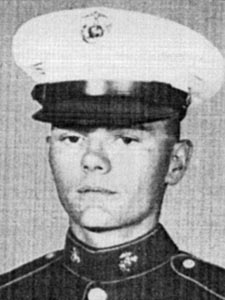
|
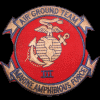
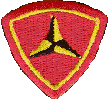
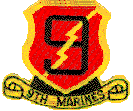
| |
|
Since 27 February 1967, U.S. Marine positions in the vicinity of the DMZ in the area of Con Thien and Gio Linh, had been subjected to almost daily mortar, rocket, and artillery attacks. On 8 May, two enemy battalions attacked marine units near Con Thien, within a half mile of the DMZ. Since that time, there were several enemy probes and company sized ground attacks against the Marine units in that area. The period had been characterized by intense combat. Since 8 May, 392 of the enemy were killed but 82 Marines were killed in action with 354 Marines wounded. The enemy had been using the DMZ area as a sanctuary, from which to conduct his mortar and rocket attacks and launch their intensive ground attacks. On 8 May, the Commander, US Military Assistance Command, Vietnam (USMACV) was finally authorized to conduct ground operations in the southern half of the DMZ. During the period 17-28 May 1967, the 3rd Marine Division was permitted for the first time to conduct search and destroy operations within the southern of the DMZ north on Con Thien and Gio Linh, and east of the Dong Ha mountains. Operation Hickory was conducted in coordination with the Special Landing Force (SLF) 1st Battalion, 3rd Marines' (1/3) Operation Beau Charger and the ARVN Operation Lam Son 54. From Marine operation reports, mid May, the following entry identified the participating units in Operation Hickory (Third Marine Division): The 9th Marines with six infantry battalions (Second Battalion, twenty sixth Marines; first and third battalions, 4th Marines; and the first and second battalions, Ninth Marines;) and the third Marines, with the third battalion, 9th Marines commenced a coordinated search and destroy operation in conjunction with Beau Charger (Special Landing Force (SLF) Alpha-Battalion Landing Team (BLT) 1/3 HMM 164)) and LAM SON 54 (1st ARVN Division with 6 battalions) in North Eastern Quang Tri Province, with significant contact for the period. The Allied attack was to be supported by a massive Navy-Marine-Air Force effort, the landing of SLFs Alpha and Bravo, and a parallel sweep by the 1st ARVN Division - all headed into the DMZ. Read all the details of Operation Hickory Battles here. On 20 May, 1845 hours, Company K, point for the 3rd Battalion, 9th Marines (acting as a screen for the left flank of Operation Hickory units), made heavy contact with an estimated enemy company deployed in prepared positions to include mutually supporting bunkers in vicinity of grid coordinates YD 104644. Initial casualties were six Marines killed in action with 51 USMC wounded in action. The battle lasted late into the evening and early morning hours. The 3/9 was the battalion screening the western flank of the units in Operation Hickory. To relieve pressure on Company K, Company L was maneuvered to the flank of the enemy position, but was unable to link up with Company K because of heavy enemy fire. The enemy used machine guns, grenades, and 60 mm mortars. Air Strikes were called. Both companies spent the night on opposite sides of the draw with the enemy force between them, while supporting arms pounded the enemy positions all night. As of 211300 hours, the battalion reported that the contact continues with unknown size enemy force. Artillery and Air support continued and casualties now reported as 26 KIA with 59 WIA. A news paper clipping reporting the death of CPL Washut indicated that it was unknown whether he was in the initial phase of Operation Hickory when 10,000 American and ARVN troops were sent into action, or part of the reserve forces sent in later due to the heavy contacts. Operation Hickory terminated at 28 2400H with 119 USMC KIA, 817 WIA, with 362 enemy KIA and 38 detainees. The Americans had flown 1,006 Air Sorties and used Naval Gun Fires for 67 missions. Killed were 25 sailors and Marines from the 3rd Battalion, 9th Marines in heavy fighting on 20 May 1967. Those killed during the contact were:
The citations for the Silver Star of Cpl Walter J. Washut, and Navy Crosses for LCpl David G. Bendorf and Pfc David E. Hartsoe, gives you an idea of the intense battle conditions these Marines faced. On Thursday, May 25, 1967 several of the area papers in Lead and Deadwood South Dakota, carried the following news article: Sheridan Grad Dies in Vietnam
SHERIDAN, Wyo. (UPI) A 1965 graduate of Sheridan High School Wednesday was reported killed in action in Vietnam. He was identified as Walter J. Washut, 20, whose parents, Mr. and Mrs. George J. Washut, how live in Cudahy, Calif. He was ths eldest son. The death brought to 23 the number of Wyoming soldiers killed in the Southeast Asian action. Washut was to have completed his 18-month tour in Vietnam in June and had planned to return to Wyoming. There was no information on details of his death. By Mike Dunn, Contributor, The Sheridan Press, July 17th, 2015 SHERIDAN - Next weekend, Jim Shell and the members of the Sheridan High School class of 1965 will gather to celebrate their 50th reunion. Many will come back for the first time in a long time to swap stories with old classmates. But for Shell, it may be difficult to see his old classmates because one of his good friends will not be among those attending. His friend's name was Walter J. Washut, and it was Washut's sacrifice to his country that allows the class of 1965 to meet next weekend. Washut was a Marine corporal who was killed in action during the Vietnam War in 1967. "If you talked to anyone, they would all say he was honest, kind and reliable," Washut's cousin Larry Aksamit said. Raised in Sheridan in an era when all boys wanted to be John Wayne, Aksamit said he and Washut grew up playing Army in their backyards, shooting BB guns, hunting and fishing in the Bighorn Mountains. "He was a real responsible person," Washut's sister, Wanda Jones, said. "He was always working; every summer he had a job." But Washut had a tough home life. His father, a World War II veteran, had seen action during his service, and took to drinking to ease the pain. "There was lots of turmoil at home," Jones said. Despite this, Washut excelled in school. His dream was to go to college to become a pharmacist. However, his college aspirations were put on hold. His family moved to California his senior year. In response to this, Aksamit recalls that Washut immediately drove to Billings, Montana, to enlist in the Marines before he had finished high school. "He didn't tell us anything about joining up at first," Aksamit said. "Once his folks moved his senior year, he stayed here until graduation then went into the Marines." "Walt was just kind of a feisty little guy, he wasn't a big fella," Shell said of his friend. "He wasn't what you would picture as one of those big Marines. But he had one of those personalities that when he got steamed up, he's the guy you want on your side." Washut and Shell, along with a few other of their classmates, were attached at the hip from eighth grade through high school, and that friendship continued even thousands of miles away in the jungles of Vietnam. Shell stayed in Sheridan to attend Sheridan College on scholarship. Every so often, Shell would receive a letter from Washut, covered in mud and wrinkled with water damage of a war zone. The letters described the horrors of Vietnam, the miserable conditions, the battles and the constant threat of a seemingly omnipresent enemy. Washut urged his childhood friend, with every letter he wrote, to stay in college and avoid getting into the war. He also promised Shell that once he got back to Sheridan, they would "go out and raise Cain." "He was in a lot of hot action," Shell said of Washut. "Every letter described another battle he had just been in. He would write stuff like 'this (battle) was a big one, and you will surely be hearing about it in the newspaper.'" But even describing the most intense battles, Washut never once said he regretted joining the Marines. In fact, he told his cousin that he was planning on reenlisting after his service was up in order to pay for his college education. The Battle of Hill 881 was among several skirmishes now referred to as The Hill Fights or the First Battle of Khe Sanh. The battle took place over two-and-a-half weeks spanning from the end of April to the beginning of May. More than 150 Marines were killed and 435 wounded in the First Battle of Khe Sanh. According to Navy records, on April 30, 1967, Washut's unit was engaged in combat against the North Vietnamese regulars, who were deeply entrenched in their positions. As gunfire and bullets filled the air, several dead and wounded Marines were stranded in an open area. Upon seeing this, Washut disregarded his own safety to help his fellow Marines. He maneuvered his way around the machine-gun fire in the open field to reach the casualties. He made several trips back and forth until all of the casualties were safely evacuated. Less than a month later, Washut distinguished himself again. His platoon was navigating the thick underbrush of the Vietnamese jungle on the night of May 20. While separated from the main body of his unit, Washut's platoon was ambushed by North Vietnamese soldiers. The first round of motor, machine-gun and small-arms fire killed and injured several in Washut's unit. Washut immediately deployed his platoon. Directing their fire toward the enemy, the platoon was able to break contact and fight their way back to the company position. Once Washut reached the company position, he moved from position to position directing his platoon's fire toward the North Vietnamese. The Navy records state that when he discovered an enemy mortar post firing rounds toward his fellow Marines, he procured an anti-tank assault weapon. He exposed himself to enemy fire and shot a round toward the mortar post - single-handedly taking out the position. Then, he heard the cries of wounded comrades trapped outside the perimeter near the enemy line. Washut rushed to the aid of the casualties while under heavy fire. He then summoned for aid and directed the evacuation for several of the fallen Marines, but stayed behind to administer first aid for one man. However, in the midst of giving aid to one of the wounded, he was injured. He died that night in the jungles of Vietnam - two days before turning 20 years old. "We were living in California at the time," Jones said. "We were living with a woman who was our foster mother, when a Marine officer came to the door. (The officer) told us our brother was killed in action. It was very, very hard." "I didn't find out until I came home from college," Aksamit said. "I walked in the kitchen and my folks were pretty upset. They told me Walt had been killed. I was upset. I just turned around, walked outside and went back to Laramie." "I had heard from one of his cousins that he was killed," Shell said. "Sure enough, it was in the papers that same day." No one was surprised to hear that Washut sacrificed himself to save others - that was just who he was. For his acts of heroism, Washut was posthumously awarded the Silver Star Medal, the third-highest military decoration for valor awarded to members of the U.S. Armed Forces. "From the time before he even shipped out, I knew he would be that kind of guy," Aksamit said. "I'm sure most of the guys in the Marine Corps would have done something similar to help his fellow Marines, but I know Walt would never have thought about leaving anyone behind." Shell still has the letters from Washut. Every Memorial Day, Veterans Day and on other days throughout the year, Shell will pull out the words of a hero and read them quietly to himself. But Shell said his friend's story needs to be told. Washut, he said, was an exceptional man who gave all. He will never have a chance to speak for himself. He will never attend a high school reunion and reminisce about the good old days over a cold beer. "These reunions, we all get together and share about what we've done with our lives; but people like Walt, they don't have that opportunity," Shell said. "He gave up everything for us." 
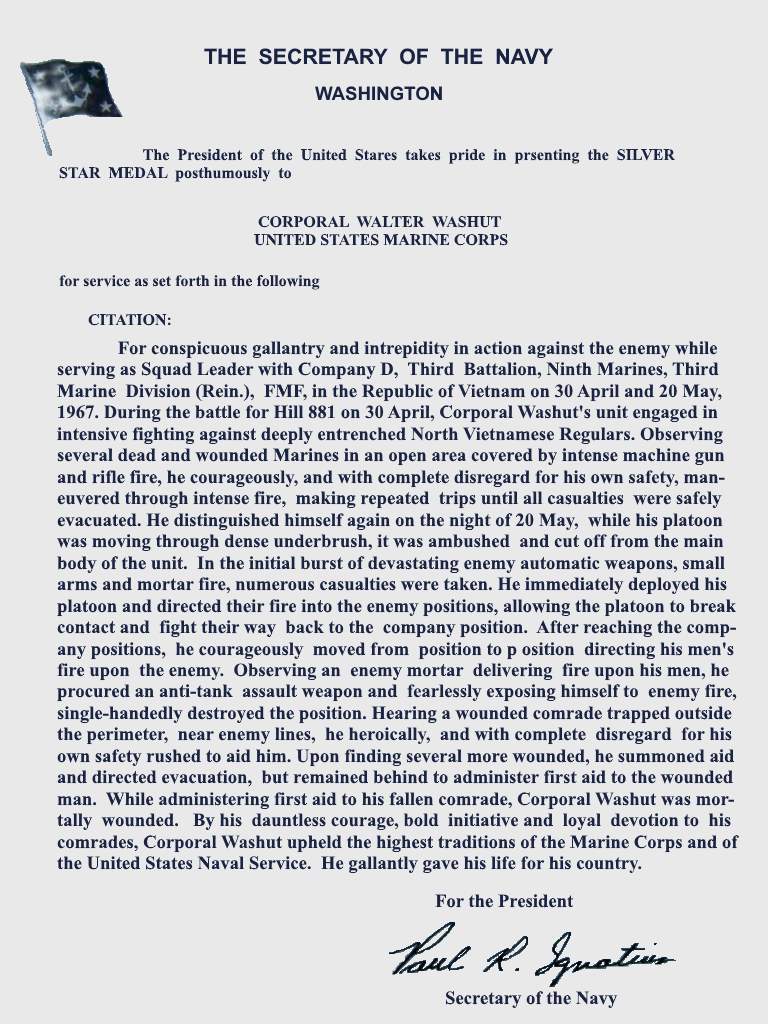
Walter Junior Washut, the eldest son, was survived by his mother, Pauline Murray Washut (1923-2011), father Geoge J. Washut (1920-1987), a World War II veteran, a brother and four sisters, and his paternal (Louise Rosalina Selig Washut (1902-1984)) and maternal (Maria F Filla Murray (1888-1969)) grandmothers, who lived in Sheridan. He was also survived by several Aunts, Uncles, and cousins. Walter is buried in the Sheridan Municipal Cemeter, Sheridan Wyoming along with some of his Aunts and Uncles. 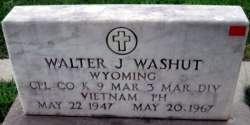
- - - The Virtual Wall, February 11, 2018 |
| Contact Us | © Copyright 1997-2019 www.VirtualWall.org, Ltd ®(TM) | Last update 08/15/2019 |